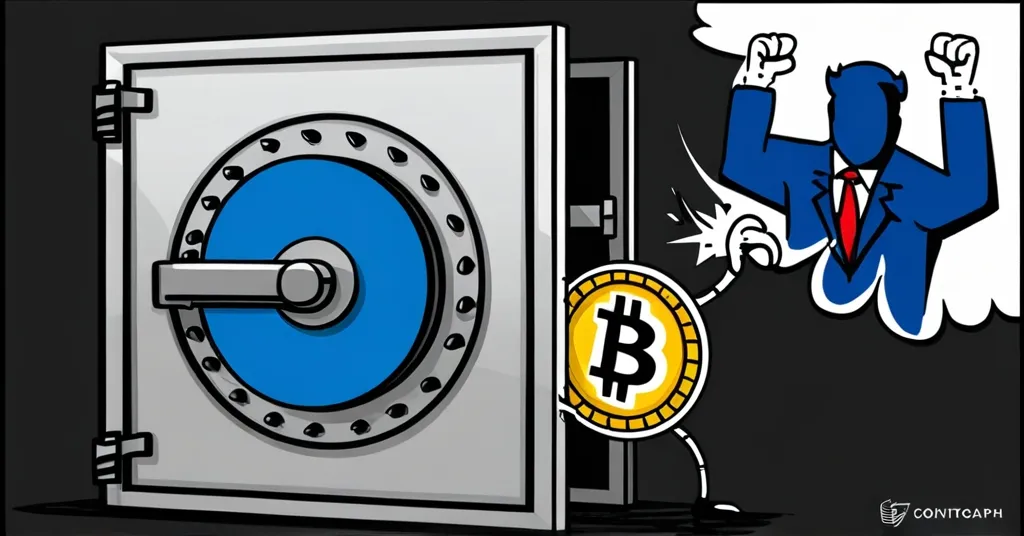US Bank Suddenly Cuts Off Anchorage Digital: Is Operation Choke Point 2.0 to Blame?

Unnamed US Bank Abruptly Cuts Ties with Crypto Firm Anchorage Digital, CEO Reveals
Nathan McCauley, CEO of Anchorage Digital, recently revealed that an unnamed American bank suddenly terminated their banking services after a two-year relationship, highlighting the issue of “de-banking” within the cryptocurrency industry. This incident aligns with broader concerns about a potential government-led initiative called “Operation Choke Point 2.0,” aimed at restricting the crypto sector. Senator Cynthia Lummis has called for the FDIC to preserve related documents, accusing the agency of destroying evidence.
- Unnamed US bank terminates Anchorage Digital’s banking services abruptly.
- Incident linked to alleged “Operation Choke Point 2.0.”
- Senator Cynthia Lummis demands FDIC preserve related documents, cites potential illegal actions.
De-banking refers to the practice of banks terminating services to certain businesses, often without warning. In this case, McCauley described the situation as “pretty ridiculous,” stating, “We had a bank that we had a growing relationship with for a number of years, who basically on a dime, decided to turn off our bank account.” This move by the bank in June 2023 not only disrupted Anchorage Digital’s operations but also highlighted the broader impact on the industry. McCauley noted, “You can only imagine what was happening to the smaller entrepreneurs who didn’t have the resources to be able to marshal in order to keep their bank accounts open.”
The sudden termination of banking services for Anchorage Digital is part of a larger trend known as Operation Choke Point 2.0. This alleged initiative, reminiscent of the original Operation Choke Point under the Obama administration, targets industries deemed high-risk, with a new focus on the cryptocurrency sector. The original Operation Choke Point aimed to cut off financial services to sectors like gun manufacturers and payday loan companies. Now, the Biden Administration is reportedly using similar tactics to restrict the digital asset ecosystem, applying regulatory pressure on banks to debank crypto firms.
Senator Cynthia Lummis, a vocal advocate for the crypto industry, has demanded that the FDIC, led by Chair Marty Gruenberg, preserve all documents related to this operation. Lummis’s strong stance is based on whistleblower claims of document destruction by FDIC officials. She warned, “If it is uncovered that anyone within the FDIC has knowingly destroyed materials or sought to obstruct the oversight functions of the Senate, it will result in swift criminal referrals to the U.S. Department of Justice. The American people deserve transparency, and I will see to it that they get the answers they deserve.”
The debanking of Anchorage Digital is not an isolated incident. Over 30 crypto founders, including Coinbase CEO Brian Armstrong, have shared similar experiences. Armstrong took legal action against the FDIC for heavily redacted documents and filed a Freedom of Information Act request, pushing back against regulatory opacity. This industry-wide reaction underscores the need for clarity and transparency in how crypto firms can access traditional banking services.
De-banking disrupts the ability of crypto firms to manage their finances, hindering their operations and growth. It forces these companies to seek alternative financial solutions, such as using stablecoins for operations. The broader economic impact cannot be ignored, with potential job losses and stifled innovation in the financial sector. As the Senate continues its hearings and the House Financial Services Committee discusses potential legislative solutions, the future of crypto’s relationship with traditional finance remains uncertain.
While the crypto industry champions decentralization and financial freedom, it must also confront the realities of regulatory overreach. Banks may be cautious due to perceived risks associated with cryptocurrencies and the regulatory pressures they face. Yet, the sudden termination of services can feel like being dumped via text message after two years of dating – it’s abrupt and leaves little room for dialogue.
To offer a balanced perspective, it’s important to consider the banks’ and regulators’ viewpoints. Banks are under scrutiny to comply with anti-money laundering (AML) and know-your-customer (KYC) regulations, which can be challenging when dealing with the crypto sector. This regulatory pressure leads to cautious approaches, sometimes resulting in de-banking. However, this does not justify the lack of transparency or sudden terminations without clear reasons.
Looking ahead, potential legislative and industry solutions are on the horizon. The ongoing Senate hearings and discussions by the House Financial Services Committee suggest that changes may be forthcoming. These could include clearer guidelines for banks on engaging with crypto firms, fostering a more symbiotic relationship between traditional finance and the burgeoning crypto sector.
- What happened to Anchorage Digital’s banking relationship?
An unnamed US bank suddenly terminated their banking services after a two-year relationship, leaving Anchorage Digital scrambling.
- What is Operation Choke Point 2.0?
It’s an alleged government initiative aimed at suppressing the cryptocurrency industry by restricting its access to banking services, echoing the tactics of the original Operation Choke Point.
- What actions has Senator Cynthia Lummis taken regarding this issue?
Senator Lummis demanded that the FDIC preserve documents related to Operation Choke Point 2.0 and warned of potential criminal referrals to the U.S. Department of Justice if evidence of wrongdoing is found.
- What are the implications of de-banking for the cryptocurrency industry?
De-banking poses significant challenges for crypto firms, limiting their ability to operate within traditional financial systems and potentially stifling innovation and growth in the sector.
- What does this situation suggest about government oversight and transparency?
The situation raises serious concerns about governmental transparency and oversight, particularly with allegations of document destruction by the FDIC, prompting calls for accountability and further investigation.
As we champion the principles of decentralization and financial freedom, we must also push for a future where innovation isn’t choked out by outdated fears and regulatory overreach. The fight for financial freedom continues, and it’s one we can’t afford to lose.



